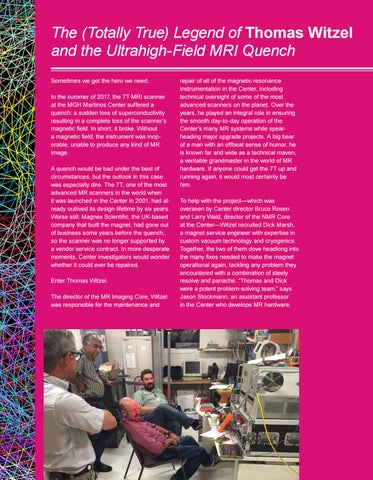The (Totally True) Legend of Thomas Witzel and the Ultrahigh-Field MRI Quench Sometimes we get the hero we need. In the summer of 2017, the 7T MRI scanner at the MGH Martinos Center suffered a quench: a sudden loss of superconductivity resulting in a complete loss of the scanner’s magnetic field. In short, it broke. Without a magnetic field, the instrument was inoperable, unable to produce any kind of MR image. A quench would be bad under the best of circumstances, but the outlook in this case was especially dire. The 7T, one of the most advanced MR scanners in the world when it was launched in the Center in 2001, had already outlived its design lifetime by six years. Worse still: Magnex Scientific, the UK-based company that built the magnet, had gone out of business some years before the quench, so the scanner was no longer supported by a vendor service contract. In more desperate moments, Center investigators would wonder whether it could ever be repaired. Enter Thomas Witzel. The director of the MR Imaging Core, Witzel was responsible for the maintenance and
108
repair of all of the magnetic resonance instrumentation in the Center, including technical oversight of some of the most advanced scanners on the planet. Over the years, he played an integral role in ensuring the smooth day-to-day operation of the Center’s many MR systems while spearheading major upgrade projects. A big bear of a man with an offbeat sense of humor, he is known far and wide as a technical maven, a veritable grandmaster in the world of MR hardware. If anyone could get the 7T up and running again, it would most certainly be him. To help with the project—which was overseen by Center director Bruce Rosen and Larry Wald, director of the NMR Core at the Center—Witzel recruited Dick Marsh, a magnet service engineer with expertise in custom vacuum technology and cryogenics. Together, the two of them dove headlong into the many fixes needed to make the magnet operational again, tackling any problem they encountered with a combination of steely resolve and panache. “Thomas and Dick were a potent problem-solving team,” says Jason Stockmann, an assistant professor in the Center who develops MR hardware.










































































